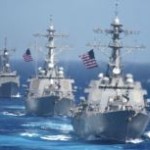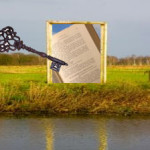July 25, 2012
July 25, 1968: Remember the Pueblo Entered National Lexicon
I posted this last year. I’ll repost it every year to remind Americans what happened 45 years ago.
In January, 1968, the intelligence ship, the USS Pueblo, was captured by North Korea. It’s crew was not released until December 23, 1968, after being tortured and beaten. Here’s a pictorial of the story, from the USS Pueblo Veteran’s Association:
Here’s the story, as retold by Oliver North:
Written by Oliver North
Thursday February 5, 2004
WASHINGTON, D.C. — “The United States won the Cold War without ever firing a shot.” It’s a claim I’ve never understood.
Though our victory was secured without a cataclysmic nuclear exchange with the Soviet Union, it took a terrible toll on American lives, limbs and treasure. From battlefields in Korea, Vietnam, Central America and the Middle East — and in the shadowy world of espionage — the Cold War was only “cold” to those who didn’t fight in it.
Last week, Cmdr. Lloyd “Pete” Bucher, USN, one of the most courageous of those “Cold Warriors,” passed from this veil of tears — a loss barely noted by my colleagues in the media. On Jan. 23, 1968, Pete Bucher was in command of the USS Pueblo, a surveillance ship that was attacked and captured by North Korea in international waters. Captain and crew were held captive for 11 months, brutally beaten and deprived of sleep, food and medical care. Their ignominious treatment wasn’t much better after they returned home.
The story of Pete Bucher is an American saga. Born in 1927, and orphaned as an infant, he was a ward of the state until adopted by Mr. and Mrs. Austin Bucher. But they, too, died during Pete’s childhood, and once again he was remanded to a state home. Finally, in 1940, Pete learned about Boys Town in Nebraska by watching Spencer Tracy portray Father Edward Flanagan. Pete wrote to the real Father Flanagan, who responded with a train ticket. Pete would later explain, “Boys Town was the only home that I ever had.”
After joining the Navy and working his way up the ranks, Bucher hoped to command a submarine. Instead, he was given the helm of the USS Pueblo, a 176-foot, World War II-era converted cargo vessel, a “flat bottomed and hard-riding ship,” according to Pete. The Pueblo carried electronic and radio equipment to intercept communications and gather intelligence. On the eve of its maiden, and only, voyage, Rear Adm. Frank Johnson cautioned Bucher, prophetically, “Remember, you are not going out there to start a war.”
The Pueblo’s orders were to cruise well off the eastern coast of North Korea, part of a top-secret mission called “Operation Clickbeetle.” But by the time the Pueblo arrived off the coast of Korea in January 1968, the uneasy armistice that had prevailed since the end of the Korean War was fraying. The North Koreans were actively infiltrating agents into South Korea, and when they attempted to assassinate South Korean President Park Chung Hee, nobody bothered to notify the Pueblo.
On Jan. 23, 1968, while in international waters, the Pueblo, armed with only two .50-caliber machine guns, was attacked by four North Korean torpedo boats. After evading a North Korean boarding party, Bucher and his crew were subjected to a barrage of cannon fire. One American crewman was killed, and 10 were wounded, including Bucher. Despite frantic radio messages from the Pueblo seeking air support, no help was forthcoming. A second North Korean boarding party captured Bucher and the surviving 81 crewmembers.
Before the Pueblo was seized, Bucher and his crew managed to smash most of the intelligence equipment and destroy much of the classified material by burning it in garbage pails. Bucher described the process as a “poor substitute” for the destruction system he had requested before setting sail.
Held in concrete cells, the Pueblo crew was starved and tortured for 11 months. Fed mostly turnips, many of the malnourished crewmen began to lose their sight. They were repeatedly beaten and burned on steam radiators. Bob Chicca, one of the crew members told me, “They would use rifle butts, or pieces of wood, whatever they had handy to beat us.” By all accounts, Bucher bore the brunt of the North Korean’s wrath. “He was beaten more than anybody else,” crewman James Kell said. “We were all beaten, we all were tortured. But (Bucher) had it double, triple, quadruple what we got.”
Stu Russell, another crewman, echoed Kell’s praise of Bucher. “The man was a giant. No matter who did what, he was always punished. I simply don’t know where he got the strength and courage to go through what he did.”
Eventually, to save the lives of his crew, Bucher signed a coerced “confession.” His men called themselves “Bucher’s Bastards,” in honor of their courageous skipper, and he encouraged them to extend a middle finger when being photographed so that Americans and officials back home would know they were resisting their torturers. The crew’s spirits rose until Time magazine reported the meaning of the gesture.
After the North Koreans read Time magazine and realized the crew’s defiance, they suffered “Hell Week” for it. “They almost killed me during Hell Week,” Bucher told me. “They redoubled their efforts to beat and torture every member of the crew.”
Finally, after nearly a year, the Pueblo crew’s release was secured, after the U.S. government agreed to a bogus “confession.” U.S. Army Maj. Gen. Gilbert Woodward repudiated the text even as he signed it on behalf of his country: “The document which I am going to sign was prepared by the North Koreans. My signature will not and cannot alter the facts. I will sign the documents to free the crew and only to free the crew.” The crew was released one by one to cross the “Bridge of No Return” from North to South Korea. “It was like coming out of the grave,” Bucher said. “I never thought I’d see that day.”
But instead of returning to accolades, Bucher came home to face a Navy Court of Inquiry criticizing him for surrendering his ship. In 1989, the Pentagon finally issued POW medals to the Pueblo crew.
During the height of the ordeal, Pete Bucher’s beloved wife, Rose, handed out bumper stickers reminding the public to “Remember the Pueblo.”
Now, 36 years after the capture, Pete Bucher is at rest overlooking San Diego Bay at Fort Rosecrans National Cemetery and the USS Pueblo is still in North Korea, on the Taedong River, near Pyongyang. His pallbearers included three of “Bucher’s Bastards,” who recalled his courage and leadership during their 11 months in North Korean hell. They are old men now, but their message is still the same: “Remember the Pueblo.”
_______________________________________________________________________________________________________
Follow USNA or Bust on Twitter
Jacqui Murray wrote Building a Midshipman, the story of her daughter’s journey from high school to United States Naval Academy. She is webmaster for six blogs, an Amazon Vine Voice book reviewer, a tech columnist for Examiner.com, Editorial Review Board member for ISTE’s Journal for Computing Teachers, Cisco guest blogger,IMS tech expert, and a weekly contributor to Write Anything. Currently, she’s editing a thriller for her agent that should be out to publishers this summer. Contact Jacqui at her writing office, WordDreams, or her tech lab, Ask a Tech Teacher.







